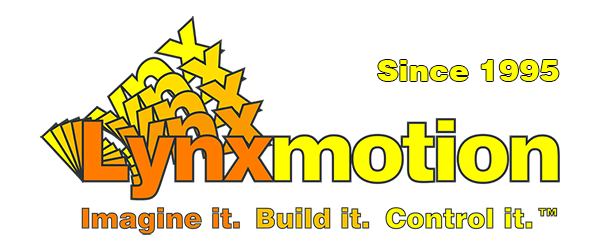Changes for page Smart Servo (LSS)
Last modified by Eric Nantel on 2024/07/03 09:40
Change comment: There is no comment for this version
Summary
-
Page properties (2 modified, 0 added, 0 removed)
Details
- Page properties
-
- Author
-
... ... @@ -1,1 +1,1 @@ 1 -xwiki:XWiki. CBenson1 +xwiki:XWiki.RB1 - Content
-
... ... @@ -1,31 +1,37 @@ 1 1 [[image:LSS-ST1-Horns.png||height="350" width="350"]] 2 2 3 -= Table of contents = 3 +== List of things with set tag == 4 +{{velocity}} 5 +#set ( $list = $xwiki.tag.getDocumentsWithTag('LSS-Ref') ) 6 +#set ( $num = 0 ) 7 +#foreach( $reference in $list ) 8 + #set ( $document = $xwiki.getDocument($reference) ) 9 + #set ( $label = $document.getTitle() ) 10 + #set ( $num = ($num + 1) ) 11 + $num) [[$label>>$reference]] :: $reference 12 +#end 13 +{{/velocity}} 4 4 5 5 {{toc/}} 6 6 7 7 = Description = 8 8 9 -The Lynxmotion Smart Servo (LSS) are new compact, modular actuators which were designto bean evolution of the standard RC servo for use in multi degree-of-freedom robotics, animatronics, custom RCprojects andmore. The lineupcurrently includes three “smart servos” which differ in maximum torque and speed,and sharethesame dimensions, mounting points and output spline. Theservos are core modules ofthenewLynxmotionServo ErectorSet (S.E.S.) anda widevariety of modular brackets, mechanics and electronics have been designedaroundthem."Smart" means eachservos' parameters areusermodifiable andconfigurable,thereissensor feedback,built-in safety features,andtheyarelthoughmeant tobe connectedtoamicrocontroller, canbe used as advanced RC actuators. ThecustomLSS serial protocol was built upontheSSC-32 / 32U protocol andmakescommunicatingwithand configuring the servoseasy and intuitive.19 +The Lynxmotion Smart Servo (LSS) lineup currently includes three “smart servos” which differ in maximum torque and speed. The easiest way to differentiate between the three models is based on the sticker, located at the rear of the servo. Lynxmotion software automatically determines which model is connected. 10 10 11 11 = Features = 12 12 13 13 * Serial, RC PWM and continuous rotation modes 14 -* Simple 24 +* Simplified LSS Communication Protocol 15 15 * Button Menu, RGB LED 16 -* Feedback:voltage, current, position, temperature,operatingstatus and more.17 -* Configurable: center position, angular range,direction,speed and much more.26 +* Sensor feedback: Voltage, current, position, temperature, status and more. 27 +* Fully configurable: center position, angular range, speed and much more. 18 18 * Libraries: Arduino, Python, ROS 19 -* 12V nominal(3S LiPo ideal), 6-12V operation*29 +* 6-12V operation (3S LiPo nominal) 20 20 * Standard 24T output spline (compatible with accessories made for Hitec 422, 645MG servos) 21 21 * Many Mounting points, brackets, accessories 22 22 23 -~* Note that the servo's maximum speed and available torque both decrease with lower input voltage 24 - 25 25 = Specifications = 26 26 27 -The easiest way to differentiate between the three models is based on the sticker, located at the rear of the servo. Lynxmotion software automatically determines which model is connected. 28 - 29 29 = Pinout = 30 30 31 31 = Wiring =

